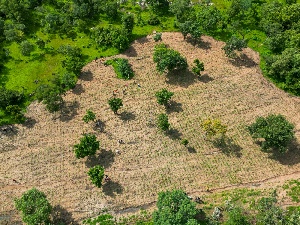- Home - News
- Elections 2024
- News Archive
- Crime & Punishment
- Politics
- Regional
- Editorial
- Health
- Ghanaians Abroad
- Tabloid
- Africa
- Religion
- Photo Archives
- Press Release
General News of Monday, 7 April 2025
Source: www.ghanawebbers.com
ACE4ES Consortium advocates enhanced agriculture to Ghana’s Nationally Determined Contributions
The Agroecology and Circular Economy for Ecosystem Services (ACE4ES) Consortium is led by the CSIR-Crops Research Institute (CSIR-CRI). It includes stakeholders from government, academia, civil society, and the private sector. The consortium emphasizes agriculture's vital role in Ghana’s climate commitments.
Supported by the Climate and Clean Air Coalition, the consortium calls for urgent actions. These actions aim to reduce Short-Lived Climate Pollutants (SLCPs). Key pollutants include methane (CH₄), nitrous oxide (N₂O), and black carbon. Addressing these pollutants will help Ghana meet its Paris Agreement goals and advance sustainable development.
Agriculture contributes about 25% of Ghana’s greenhouse gas emissions. It produces significant methane from rice and livestock systems. Nitrous oxide comes from fertilizers and manure use. Black carbon emissions result from biomass burning practices. Reducing SLCPs can quickly mitigate climate change, improve air quality, and boost health and agricultural productivity.
To meet Ghana’s climate targets, the ACE4ES Consortium proposes several measures:
- Reduce methane emissions by 25-30%. This can be done through better livestock management, manure handling, and sustainable rice cultivation techniques like Alternate Wetting and Drying (AWD) and System of Rice Intensification (SRI).
- Achieve at least a 25% reduction in nitrous oxide emissions. This involves optimizing nitrogen management, improving manure practices, and using integrated soil fertility strategies such as biochar and composting.
- Aim for a minimum of 40% reduction in black carbon emissions. This can be achieved by promoting sustainable agricultural residue management, banning open biomass burning, and encouraging agroforestry along with sustainable household energy alternatives.
The consortium stresses the need for strong collaboration among stakeholders. Capacity building, better emissions data management, and adequate financing are essential to reach these targets.
The ACE4ES Consortium is committed to providing technical support. It aims to facilitate stakeholder engagement and advocate for evidence-based policies that benefit Ghana’s agriculture sector contributions to Nationally Determined Contributions (NDCs).
The group urges policymakers, private sector leaders, civil society organizations, research institutions, farmers, and international partners to work together. Their goal is to create a resilient, climate-smart agricultural future for Ghana and beyond.











